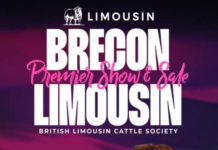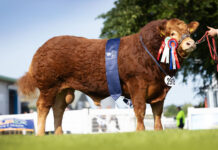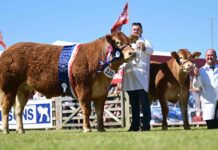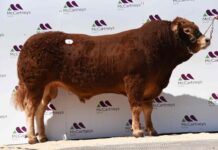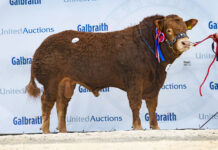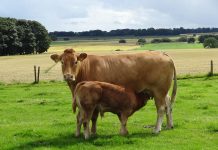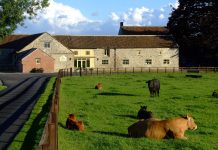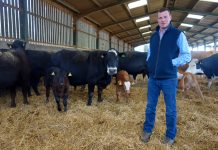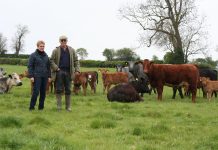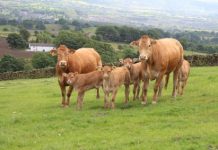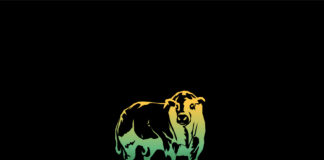‘Weight pays’ is the simple mantra for Fordham, Newmarket-based commercial and pedigree cattle farmers Roger & Daniel Turner and it’s one they aim to practice with every one of the 1,400 cattle they finish every year.
The reasoning behind it is simple, says Roger Turner. “When store cattle are as expensive as they are we have to add plenty of weight to them in order to earn a profit. All the time the cattle are gaining weight then we’ve got a chance of earning something out of them.”
With most cattle bought in from markets across the country and put through their finishing unit, the aim for the father and son team is to maximise the weight gain in a 90-100 day finishing period. “We don’t weigh every beast regularly, but we do check-weigh a selection from every batch and they generally gain about 1.5kg/day while they’re with us,” adds Daniel Turner.
Key to this is a diet based largely on maize silage and also containing brewers’ grains, biscuit meal and, when in season, parsnips. “This ration is fed 12 months of the year to the finishing cattle and keeps them growing at decent rates all the time.”
Average carcase weights from the finishers are about 420kg, with the goal being for every beast to grade at R and above, explains Mr Turner. “We’re not too fussed on the breed of the store we buy in as we can’t afford to be. We’re in the markets buying stores every week to keep the throughput right; if we got too fussy we wouldn’t be able to do the numbers we do. The crucial thing in making money out of these cattle is buy them at the right price, feed them right and sell them when they’re fit.”
Finished cattle are all sold deadweight to Woodhead Brothers’ abattoir at Spalding, with the aim being to have one load a week sold. “So far this year we’ve killed 750 cattle with only 21 grading as O grades and everything else grading R or better.
“Most bullocks are with us for 90-100 days before being slaughtered although with some of the more forward cattle it is a struggle to keep them here for 90 days to ensure they become farm assured before slaughter.”
But while breed choice has little to do with bought -in store cattle, an element of choice is exercised when it comes to the breeding of the family’s own 300-cow suckler herd. “Cow type has traditionally been based on dairy crosses, but in recent years we’ve moved towards three-quarter Limousin-cross heifers due to quality issues with dairy crosses.
“This choice of breeding is working well, with every cow and heifer put back to a Limousin bull as these cattle can take the weight without going too fat. They have good calf vigour, good growth and, if you use the right type of bull, can hit the top weights we’re looking for.
“It is crucial though that we use the right type of Limousin. We don’t want the stockier, squatter type, we need growth and size. Bigger ended cattle look great, but can lead to calving difficulties and simply don’t suit our system.”
At the moment the commercial bull team comprises bulls from the Grange, Fenrose, Brockhurst and Blounts Herds as well as two from the Meadowfield Herd of the Turner’s stockman, Robert Wright.
“Bulls are sourced from herds of known health status and in-coming heifers for the suckler herd are vaccinated for BVD and leptospirosis on arrival, with all grazing stock receiving a mineral drench twice a year to alleviate known copper and selenium deficiencies in the grazing land.”
 And herd management is a strict regime, with cows failing to get in calf or not performing as well as the Turners would like, culled at the first opportunity. “With cull cow prices as high as they are it makes sense to sell on those cows not doing the job and bring in a replacement heifer. A few years ago when cull cows went on the OTM cull, it was tempting to keep on a few of the lesser performing cows. But that isn’t the case anymore; every cow has to pay her way.”
And herd management is a strict regime, with cows failing to get in calf or not performing as well as the Turners would like, culled at the first opportunity. “With cull cow prices as high as they are it makes sense to sell on those cows not doing the job and bring in a replacement heifer. A few years ago when cull cows went on the OTM cull, it was tempting to keep on a few of the lesser performing cows. But that isn’t the case anymore; every cow has to pay her way.”
Homebred calves are grazed to grow frame before heading to the finishing yards, with grazing taken from a number of landlords, including several Newmarket studs. “Because we’re on some lighter land we’re able to out winter all the suckler cows at grass, offering them grass silage and a cow cob through the winter. This saves significantly on housing costs, although we do provide them with straw lying pads to ensure they have a dry bed.”
Spring-born calves and in-calf heifers are out wintered on stubble turnips, again with straw pads and run-back areas available to them for dry beds, with 10,000 12’x10′ bales of straw and 3,000 round bales of grass silage used each year.
A recent introduction to the cattle enterprise is the addition of a pedigree Limousin herd run under the Bassingbourn prefix, a herd that was founded in spring 2011.
“The aim of the herd is to breed bulls both for ourselves and for sale and also to produce some top quality heifers for sale,” explains Mr Turner. “I’d like to aim to breed top quality Limousins and, with that in mind, have sourced foundation stock from some of the best UK and French bloodlines.”
“We started out last April buying a few females from the East Midlands Club Sale at Newark and then bought from both the Grange and Winnington sales last year and the October Newark sale, too. We bought a few more from Newark this April also, including the Female Champion Ironstone Fruitytuity, a Wilodge Vantastic daughter, and some from the Brockhurst Production Sale held on the same day. In addition were a number of Bailea heifers from Brian Jones.”
Continuing in the same vein as their commercial bull choices, the selection of females for the pedigree herd has been based on looking for taller, bigger-framed animals. “We want the shape, too but first and foremost need the size in the cattle.
“We haven’t been too prescriptive about bloodlines either, aiming to get a good mix of genetics at the foundation of the herd. Heifers by Salomon, Vagabond, Chabal and Imperial make up the main French influences in the herd, while Greensons Gigolo, Wilodge Vantastic, Broadmeadows Cannon, Mayfields Drambuie are some of the leading British lines in the foundation stock.”
Having had commercial success with Grange bloodlines in the past, the Turners felt the type of cattle bred by the Smith Family would be a suitable foundation for the herd.
And on the male side, a number of leading sires have been used by AI, including Ampertaine Abracadbra, Wilodge Cerberus and Grahams Samson, with stock bulls Mereside Filip, Grange Fusilier, Grange Farquhar, Brockhurst Festival and Barts Freestyle all adding their own genetics to the herd.
Alongside the cattle business, the family also run a significant arable enterprise, including 184 hectares of maize grown for silage, with a further 192ha of wheat, 46ha of barley, 76ha of oilseed rape and 79ha of sugar beet. “We also contract lift 700ha of sugar beet for local farmers, with most of the maize grown on rented ground after late root crops have been lifted.”


